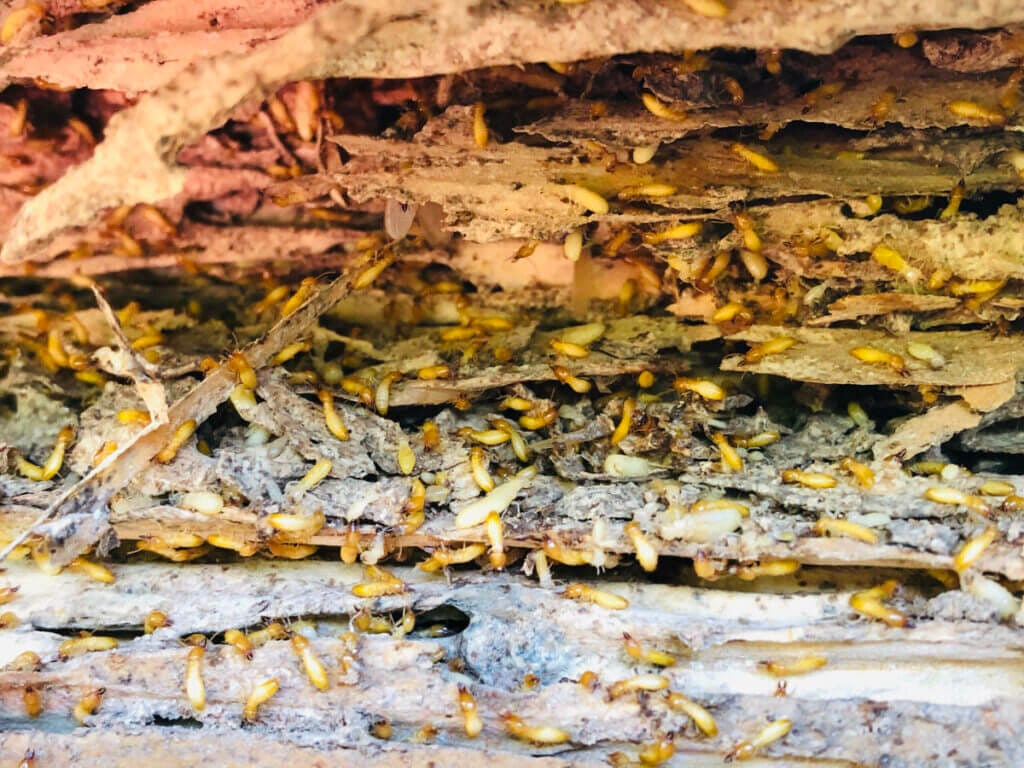Termites are by far the most destructive pests in the world. These little creatures have a unique ability to continuously eat away at your wood 24 hours a day, 365 days a year, and go undetected. A single termite colony can have upwards of 2,000,000 workers. Yet, these pests are so stealthy that an entire colony can thrive in your wood for 8-10 years without you ever noticing! Without termite treatment for your Severna Park home, that gives them enough time to wreak havoc and severely destroy its structural integrity.
Unfortunately, all parts of the Severna Park area are at risk without termite control. The most common types of termites invading homes in this area include drywood termites, dampwood termites, and subterranean termites. Park Pest Control technicians are the experts in termite control in Severna Park and surrounding areas. Our termite treatment and inspection experts use professional detection tools and technology to detect termite activity within your property and eradicate it quickly and effectively.

Like many other common household pests, termites begin their lives as eggs laid by adults. However, their lifecycle is pretty different from other insects because they do not undergo complete metamorphosis (egg, larvae, pupa, and adult). Instead, a termite life cycle progresses through three stages (egg, nymph, and adult), a process known as incomplete metamorphosis.
Termite eggs typically take 1-2 weeks to hatch into nymphs. Termite babies (nymphs) closely resemble their adult counterparts with two antennae, six legs, and three body parts. However, the nymphs have a pale white color and are much smaller than adults. Termites are social insects that live in a caste system. When the nymphs develop into adults they take up positions in the caste as either workers, soldiers, alates, or reproductives (king & queen).
Home-invading termites mainly feed on cellulose which is found in wood and wood by-products such as cotton, paper, insulation, and cardboard. Most termite species prefer untreated softwood with high moisture content and the presence of rot or fungus. However, drywood termites mainly feed on hardwood floors, furniture, and framing.
Because termites are social insects, not all members of their colony feed directly on the wood. Termite babies, soldiers, and reproductives cannot feed themselves directly. Hence, worker termites actively forage for food (cellulose) and transfer it to these castes through regurgitation.
Termites are often called ‘silent destroyers.’ That’s because of their ability to chew wood from the inside out, often without being noticed. However, you may notice the following signs of a termite infestation on your property.
Believe it or not, a termite queen can lay as many as 25 eggs per minute, 30,000 eggs in a day, and millions of eggs in her lifetime! When you have termites their extermination requires the best pest control service available with the newest and most effective treatment options. At Park Pest Control, we offer a wide variety of termite treatment and inspection options in Severna Park to protect your home from these aggressive pests.
Our licensed termite control technicians in Severna Park and the surrounding communities use industry-leading technology and local knowledge to carry out a comprehensive inspection of your property and exterminate the wood-destroying pests. Our termite treatment options include, but are not limited to the following:
Chemical treatment: We use industry-approved pesticides to prevent or treat termite infestations in your home. Our treatments have demonstrated the ability to effectively protect your structures from termite activity long-term.
Treatment barrier: We feel the best way to keep termites away from your home is by applying a subterranean barrier treatment. Our Severna Park termite control technician will use specialized high-pressure equipment to inject liquid termicide into the soil surrounding the perimeter of your home or business. As termites burrow toward your building via the treated area, they will carry the termicide back to the colony destroying the population.
Pre-construction termite treatment: Our experts are trained and certified to treat new structures against termites during the initial construction phase. They will apply a highly effective termite treatment to the soil before the slab is poured, effectively preventing access of subterranean termites to your building.
Our annual termite inspection services ensure early detection of wood-destroying pests while preventing the potential for extensive termite damage. We will help you decide the most effective termite treatment option for your home or business and create a customized termite management plan that meets your unique home or commercial pest control needs. If you’re worried about termites, don’t hesitate to call or text Park Pest Control today for more information 443-926-6143
Expert Exterminator & Pest Control Services in Severna Park, Arnold, Pasadena and Millersville, MD
License #32735. Insured and Bonded.
Copryright © 2025 . All Right Reserved.
License #32735
Insured and Bonded.
Copryright © 2025 . All Right Reserved.